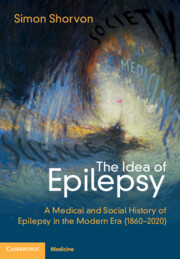Book contents
- The Idea of Epilepsy
- The Idea of Epilepsy
- Copyright page
- Dedication
- Contents
- Preface
- Section 1 The Voyage Of The Good Ship Epilepsy
- Section 2 ‘A Plague upon Your Epileptic Visage’
- One 1860–1914: The Birth of Modern Epilepsy
- Two 1914–1945: Epilepsy in the Age of Catastrophe
- Three 1945–1970: Epilepsy and the New World Order
- Four 1970–1995: Epilepsy in a Globalised World
- Five 1995–2020: The Epilepsy Floods are Too Recent
- Section 3 Epilepsy: The Paradigm of the Suffering of Both Body and Soul in Disease
- Book part
- Glossary
- Bibliography
- Index of Names
- Index
Five - 1995–2020: The Epilepsy Floods are Too Recent
from Section 2 - ‘A Plague upon Your Epileptic Visage’
Published online by Cambridge University Press: 13 January 2023
- The Idea of Epilepsy
- The Idea of Epilepsy
- Copyright page
- Dedication
- Contents
- Preface
- Section 1 The Voyage Of The Good Ship Epilepsy
- Section 2 ‘A Plague upon Your Epileptic Visage’
- One 1860–1914: The Birth of Modern Epilepsy
- Two 1914–1945: Epilepsy in the Age of Catastrophe
- Three 1945–1970: Epilepsy and the New World Order
- Four 1970–1995: Epilepsy in a Globalised World
- Five 1995–2020: The Epilepsy Floods are Too Recent
- Section 3 Epilepsy: The Paradigm of the Suffering of Both Body and Soul in Disease
- Book part
- Glossary
- Bibliography
- Index of Names
- Index
Summary
In this period, the science and medicine of epilepsy continued to expand rapidly, and a selection of the leading theories and practices are described. There were significant scientific advances in relation to mechanisms of epileptogenesis and epilepsy-induced cerebral damage, including work on ion channels, neurotransmitters, cerebral networks and systems. There were major advances in the basic and clinical genetics of epilepsy. Other clinical developments occurred in fields including the epidemiology of epilepsy, status epilepticus, rare causes of epilepsy, the use of big data, and in drug and surgical treatment of epilepsy. Epilepsy research had become a worldwide phenomenon, and the medical literature on epilepsy expanded greatly. In the social sphere, too, epilepsy was changing. The Global Campaign Against Epilepsy raised the profile of the condition at governmental level internationally, and this was a period when political lobbying for epilepsy increased and when the voice of people with epilepsy could be strongly heard on social media and also, for the first time, in numerous memoirs and autobiographies by authors with epilepsy. Epilepsy now featured frequently in books and films, with a new realism and more sympathetic tone than in the past.
Keywords
- Type
- Chapter
- Information
- The Idea of EpilepsyA Medical and Social History of Epilepsy in the Modern Era (1860–2020), pp. 498 - 582Publisher: Cambridge University PressPrint publication year: 2023



